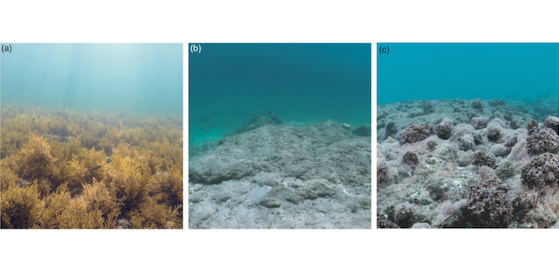Peleg, O., Guy‐Haim, T., Yeruham, E., Silverman, J., & Rilov, G. (2020) Tropicalisation may invert trophic state and carbon budget of shallow temperate rocky reefs. Journal of Ecology, 108(3), 844-854; https://doi.org/10.1111/1365-2745.13329
Abstract
- Global warming mediates and maintains the tropicalization of temperate marine ecosystems. Recent studies have demonstrated that this process causes shifts from algal forests to denuded non-canopy states in temperate reefs. It has been suggested that these changes would incur significant consequences to ecosystem functioning.
- In this study, we tested how tropicalization affects habitat-provisioning functions and carbon turnover of a shallow reef in the fast-warming and highly invaded southeastern Mediterranean Sea, in-situ. On a single shallow reef, we conducted measurements of these functions in three habitats: dwindling native brown algal (Cystoseira) forest, dominant turf (formed by overgrazing of tropical rabbitfish) and expanding tropical shrubs dominated by red calcifying algae (Galaxaura rugosa).
- Algal forest was an autotrophic net carbon sink and provided habitat for high species diversity and the largest community biomass. The denuded turf was heterotrophic and provided habitat for the lowest species diversity and community biomass. While diversity was as high in tropical shrubs as in the algal forest, it had lower biomass and functioned as a heterotrophic net carbon source.
- Synthesis. Our study exemplifies possible functional consequences of tropicalization-driven regime shifts on shallow temperate rocky reefs, and how these can invert the net trophic state and carbon balance.

